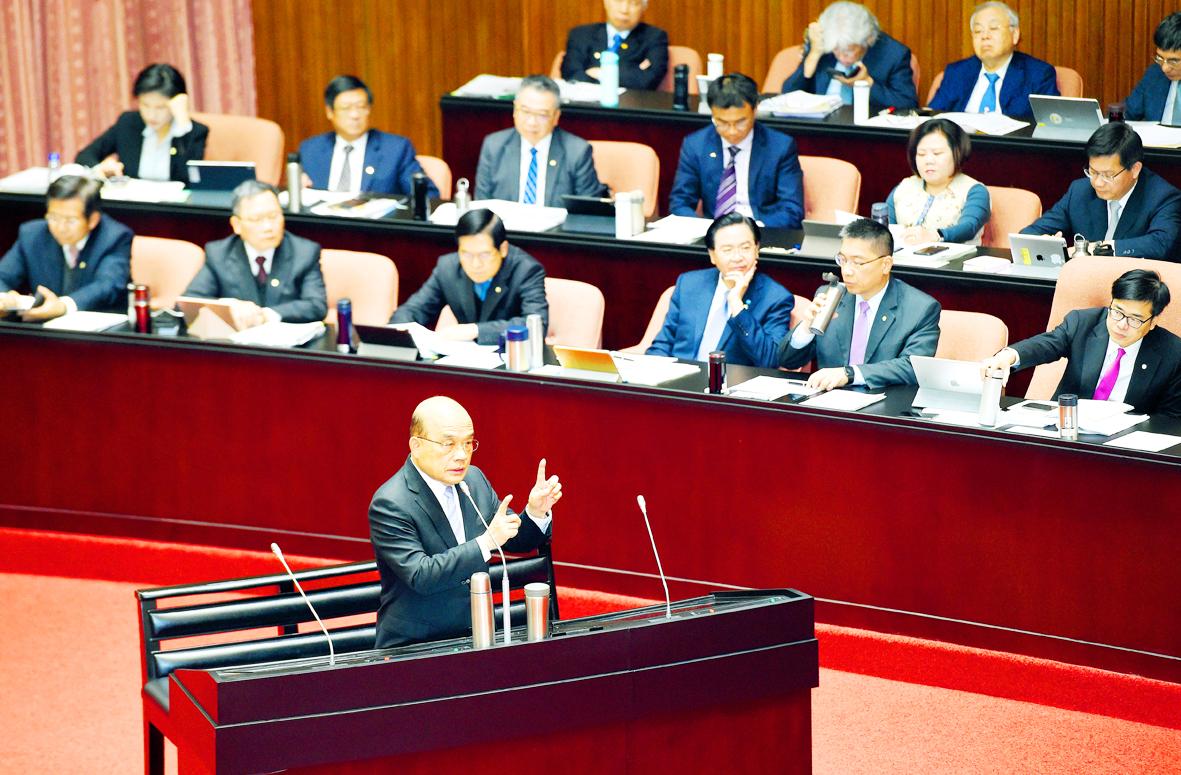The government aims to provide an economic stimulus by encouraging consumption, not by sending people big checks, Premier Su Tseng-chang (蘇貞昌) said yesterday in response to calls by Chinese Nationalist Party (KMT) lawmakers for the government to up the ante on planned coupons to revitalize sectors affected by the COVID-19 pandemic.
Su made the remarks when fielding a question from KMT Legislator Lo Ming-tsai (羅明才) during a plenary session at the Legislative Yuan in Taipei on whether the government could give each resident NT$10,000 (US$330) in cash instead of coupons with a face value of NT$800.
The US on Thursday introduced an economic stimulus package that would, if approved, give each US citizen US$1,200 and each child US$500, Lo said.

Photo: Liao Chen-huei, Taipei Times
The Democratic Progressive Party administration has spent NT$2 trillion building offshore wind farms, more than NT$800 billion on the Forward-looking Infrastructure Development Program, and hundreds of billions on arms procurement and a program to build submarines domestically, Lo said.
The government is rich, so it should be able to roll out more generous stimulus packages, he said.
Su said that it would be easy for the government to mindlessly push up the national debt by giving people cash, just as the administration of then-president Ma Ying-jeou (馬英九) did during the 2008 financial crisis, when it gave people NT$3,600 consumer vouchers, increasing national debt by more than NT$80 billion.
The government hopes to improve on the former administration’s policy by using a different approach, one that incentivizes people to go shopping, Su said.
Lo asked whether the government could give each resident NT$8,000, to which the premier replied that it is not a question of the amount, but of the government’s stance.
More subsidy programs to help stricken sectors stay afloat are under way, for example a fuel subsidy for taxis would go into effect next month, Su said.
Other KMT lawmakers who had signed up to speak at the beginning of the meeting clamored for more generous stimulus packages.
Despite the government having announced that the National Stabilization Fund, which is worth NT$500 billion, would be used to buoy the TAIEX, and the central bank cutting its rediscount rate, panic buying on Thursday showed that the measures were not enough to allay people’s concerns, KMT Legislator Wu Sz-huai (吳斯懷) said.
KMT Legislator Lee De-wei (李德維) said that it was not only the US that has plans for cash handouts, the governments of Hong Kong and Singapore are mulling stimulus packages that would give residents HK$10,000 (US$1,289) and S$300 (US$207) respectively.

Right-wing political scientist Laura Fernandez on Sunday won Costa Rica’s presidential election by a landslide, after promising to crack down on rising violence linked to the cocaine trade. Fernandez’s nearest rival, economist Alvaro Ramos, conceded defeat as results showed the ruling party far exceeding the threshold of 40 percent needed to avoid a runoff. With 94 percent of polling stations counted, the political heir of outgoing Costa Rican President Rodrigo Chaves had captured 48.3 percent of the vote compared with Ramos’ 33.4 percent, the Supreme Electoral Tribunal said. As soon as the first results were announced, members of Fernandez’s Sovereign People’s Party

MORE RESPONSIBILITY: Draftees would be expected to fight alongside professional soldiers, likely requiring the transformation of some training brigades into combat units The armed forces are to start incorporating new conscripts into combined arms brigades this year to enhance combat readiness, the Executive Yuan’s latest policy report said. The new policy would affect Taiwanese men entering the military for their compulsory service, which was extended to one year under reforms by then-president Tsai Ing-wen (蔡英文) in 2022. The conscripts would be trained to operate machine guns, uncrewed aerial vehicles, anti-tank guided missile launchers and Stinger air defense systems, the report said, adding that the basic training would be lengthened to eight weeks. After basic training, conscripts would be sorted into infantry battalions that would take

GROWING AMBITIONS: The scale and tempo of the operations show that the Strait has become the core theater for China to expand its security interests, the report said Chinese military aircraft incursions around Taiwan have surged nearly 15-fold over the past five years, according to a report released yesterday by the Democratic Progressive Party’s (DPP) Department of China Affairs. Sorties in the Taiwan Strait were previously irregular, totaling 380 in 2020, but have since evolved into routine operations, the report showed. “This demonstrates that the Taiwan Strait has become both the starting point and testing ground for Beijing’s expansionist ambitions,” it said. Driven by military expansionism, China is systematically pursuing actions aimed at altering the regional “status quo,” the department said, adding that Taiwan represents the most critical link in China’s

‘REALLY PROUD’: Nvidia would not be possible without Taiwan, Huang said, adding that TSMC would be increasing its capacity by 100 percent Nvidia Corp CEO Jensen Huang (黃仁勳) on Saturday praised and lightly cajoled his major Taiwanese suppliers to produce more to help power strong demand for artificial intelligence (AI), capping a visit to the country of his birth, where he has been mobbed by adoring fans at every step. Speaking at an impromptu press conference in the rain outside a Taipei restaurant, where he had hosted suppliers for a “trillion-dollar dinner,” named after the market capitalization of those firms attending, Huang said this would be another good year for business. “TSMC needs to work very hard this year because I need a lot